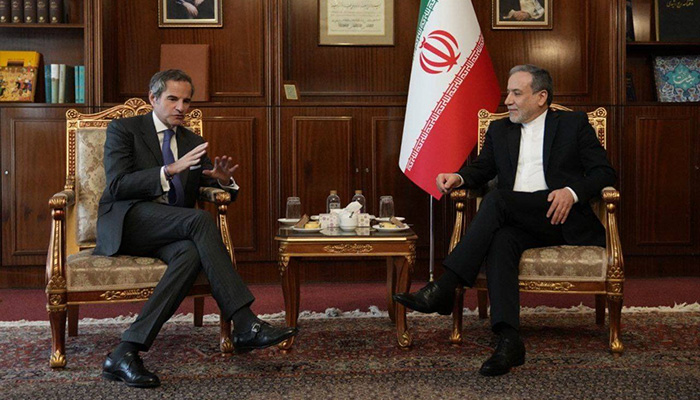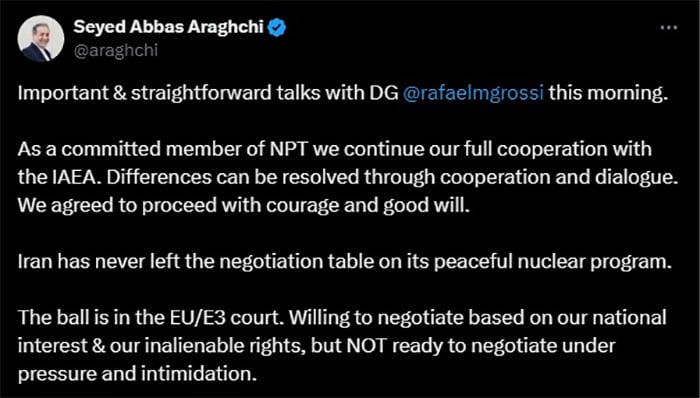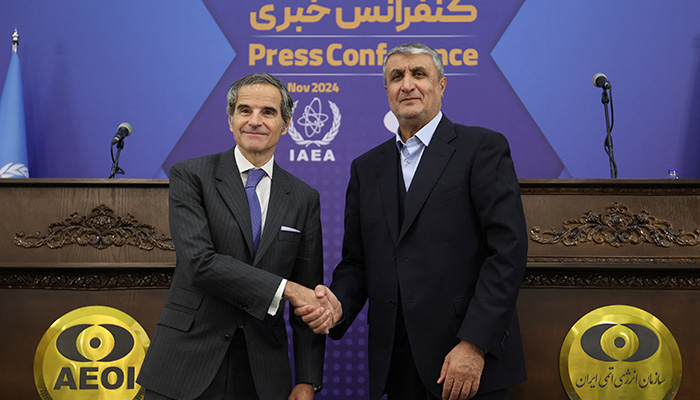
[ad_1]

- “Ball is in EU/E3 court,” says FM Abbas Araghchi on X.
- Tehran to send message to EU powers via Grossi: official.
- Iran’s nuclear chief says meeting with Grossi “constructive”.
Iran is willing to resolve outstanding disputes over its nuclear programme but won’t succumb to pressure, its foreign minister told the UN nuclear watchdog head on Thursday, as European countries push for diplomacy before Donald Trump’s return to the White House.
“The ball is in the EU/E3 court,” Foreign Minister Abbas Araghchi wrote on X following talks in Tehran with IAEA chief Rafael Grossi, referring to three European countries — France, Britain and Germany — which represent the West alongside the United States at nuclear talks.
“Willing to negotiate based on our national interest and inalienable rights, but not ready to negotiate under pressure and intimidation,” Iranian state media quoted Araghchi as saying. “I hope the other side will adopt a rational policy.”

A senior Iranian official told Reuters that Tehran would send a message to the three European powers through Grossi about Tehran’s seriousness to resolve its nuclear standoff, while stressing that any pressure on Tehran would have the opposite effect.
Diplomats told Reuters on Wednesday that Britain, France and Germany are pushing for a new resolution against Iran by the International Atomic Energy Agency board next week to pressure Tehran over what they view as its poor cooperation.
Trump’s return to office as US president in January upends nuclear diplomacy with Iran, which had stalled under the outgoing administration of Joe Biden after months of indirect talks.
During Trump’s previous tenure, Washington ditched a 2015 nuclear deal between Iran and six world powers that curbed Tehran’s nuclear work in exchange for relief from international sanctions.
Trump has not fully spelled out whether he will continue his “maximum pressure” policy on Iran when he takes office.
Relations between Tehran and the IAEA have soured over several long-standing issues including Iran barring the agency’s uranium-enrichment experts from the country and its failure to explain uranium traces found at undeclared sites.
In August, the agency said Iran’s production of highly enriched uranium continues and it has not improved cooperation with it, despite a resolution passed by the IAEA Board of Governors in June.
Grossi, who has long sought progress with Tehran over its fast-advancing nuclear work, said: “Inspections are just one chapter of our cooperation and cannot be discussed.”
The US withdrawal from the nuclear pact in 2018 and the reimposition of sanctions prompted Tehran to violate limitations on its uranium enrichment – seen by the West as a disguised effort to develop nuclear weapons capability.
Tehran is now enriching uranium to up to 60% fissile purity, close to the roughly 90% required for an atom bomb. Tehran says its nuclear work is purely for peaceful purposes.
Iran’s nuclear chief Mohammad Eslami said his meeting with Grossi was “constructive” but he warned that Tehran would react immediately to any resolution against it at an IAEA meeting next week, without elaborating.

A senior Iranian official told the news agency on Wednesday that Tehran’s reaction to a resolution could be to limit diplomatic and technical cooperation with the IAEA.
Grossi, in a televised joint press conference with Eslami, urged Tehran to take steps to resolve the remaining issues.
“It is in our power here to take concrete steps that will indicate clearly, to the US and the international community, that we can clarify things and move forward with concrete solutions,” Grossi said.
Grossi, who arrived in Tehran on Wednesday, met Iranian President Masoud Pezeshkian for the first time since Pezeshkian took office in August. The IAEA chief is scheduled to visit Iran’s Natanz nuclear plant and its Fordow site, which is dug into a mountain.
On Tuesday, Pezeshkian, seen as relatively moderate, said Tehran would not be able to ignore its arch-foe the United States and needs to “handle its enemies with forbearance”.
[ad_2]
Source link